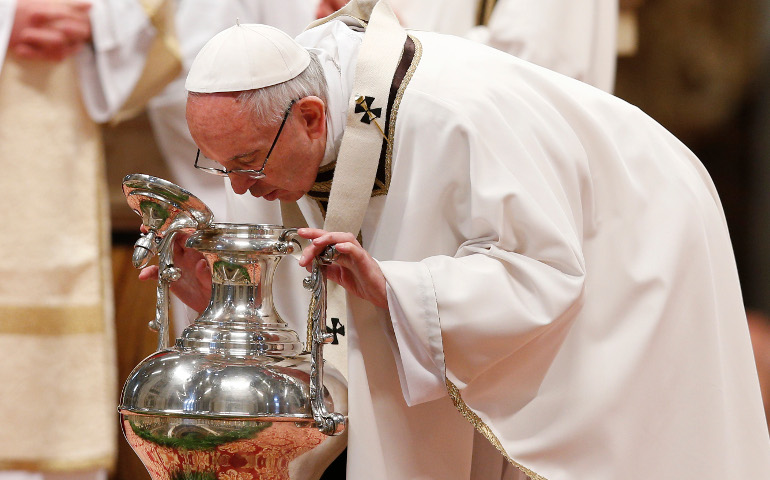
Pope Francis breathes over chrism oil, a gesture symbolizing the infusion of the Holy Spirit, during the Holy Thursday chrism Mass in St. Peter's Basilica at the Vatican April 13. (CNS/Paul Haring)
Pope Francis told an Italian newspaper his reason for visiting prisoners on Holy Thursday was straightforward: It's what Jesus told his followers to do.
"The Gospel passage on the universal judgment says: 'I was a prisoner and you visited me,'" the pontiff says in an interview with Italy's La Repubblica April 13. "This is Jesus' mandate for all of us, but especially the bishop who is father of everyone.'"
"Some say: 'They are guilty,'" the pope says about the prisoners. "I respond with Jesus' words: 'Whoever is not guilty, throw the first stone.' Let's look inside ourselves and we will come to see our own guilt. And then the heart will become more human."
Francis was speaking in an interview that was published hours before he was to celebrate the Holy Thursday liturgy at Italy's Paliano prison, located about 50 miles east of Rome. The facility is Italy's only prison dedicated to holding criminals who also acted as police informants, mainly in cases against mafia members or organizations.
During the ceremony, Francis is expected to wash the feet of 12 prisoners, including three women.
La Repubblica asked the pope how he had to come to learn to visit prisons and prisoners. Francis responds that he learned from the example of Cardinal Agostino Casaroli, who served as Pope John Paul II's Secretary of State from 1979-90.
Francis says Casaroli would visit a juvenile prison near Rome. "Every Saturday evening he would disappear," said the pope. "'He is resting,' they said."
"He would arrive by bus, with his briefcase, and would remain to hear confessions from the children and to play games with them," says Francis. "They called him Don Agostino, no one knowing well who he was."
The pope says Casaroli had been visiting the prison since long before he was a cardinal, and that Pope John XXIII once asked him about it.
"Do you continue to visit those kids?" Francis recounts John asking Casaroli once. "I'll ask you a favor," John told the priest. "Do not abandon them ever."
Francis is also asked in the interview if he believes visiting those who have been rejected by society is the "principal action" of the church.
"I believe so," the pope responds. "To go out, to make ourselves close to the least, the marginalized, the rejected."
"When I am in front of a prisoner, for example, I ask myself why him and not me?" he continues. "Am I better than him who is here inside [the prison]? Why did he fall and not me? It is a mystery that brings me close to them."
Francis then speaks about his episcopal motto, Miserando atque eligendo. Taken from a homily about Jesus' choosing of his apostle Matthew by 8th century St. Bede, it can be translated literally as "mercying, he chose him."
"It is more than a simple motto," says the pontiff. "It is my north star. Because in it is contained the mystery of a God ready to take upon himself the evil of the world just to demonstrate his love for the human being."
The pope also speaks in the interview about the continuing situation of violence around the world, which he has previously called a world war fought in pieces.
"I think that sin manifests itself today with all its destructive strength in the wars, in the diverse forms of violence and mistreatment, in the abandonment of the most fragile," Francis says.
"Those who pay the costs are always the least, the defenseless," he continues. "It comes to me only to ask with more strength: peace for this world subjected to arms traders that earn their money with the blood of men and women."
"I always ask: What is the purpose [of these wars]?" the pontiff asks. "Does violence allow us to reach worthy, long-lasting goals? All that might be obtained, does it not let loose reprisals and a spiral of lethal conflict that brings benefits only to a few 'lords of war?'
"Violence is not the cure for our broken world," the pope exhorts. "Responding to violence with violence brings, in the best hypothesis, forced migrations and enormous suffering, so great quantities of resources are dedicated to military efforts and subtracted from the daily needs of young people, of families in difficulty, of the sick, of the great majority of the inhabitants of the world."
"In the worst of cases it can bring death, physical and spiritual, to many, if not everyone," he continues.
Francis concludes the interview by speaking again about his reasons for visiting prisoners.
"Sometimes a certain hypocrisy pushes us to see prisoners only as people who have made mistakes for which the only way is prison," says the pontiff. "But ... we all make mistakes. All of us in one way or another have made mistakes."
"[This] hypocrisy does not think of the possibility of changing lifestyle: there is little trust in rehabilitation, in reinsertion into society," says the pope. "In this way we forget that we are all sinners and, often, we are also all prisoners who have not been held to account."
"When you remain closed up in your own prejudices, or a slave to idols of a false good, when you move inside ideological schemes or you absolve market laws that squash people, in reality you do nothing other than remain between the narrow walls of the cell of individualism and self-sufficiency, deprived of the truth that creates liberty," says Francis.
"Pointing the finger against someone that has made a mistake does not become an alibi for hiding your own contradictions," he states.
[Joshua J. McElwee is NCR Vatican correspondent. His email address is jmcelwee@ncronline.org. Follow him on Twitter: @joshjmac.]

